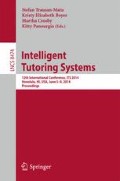Abstract
Computational Thinking (CT) can effectively promote science learning, but K-12 curricula lack efforts to integrate CT with science. In this paper, we present a generic CT assessment scheme and propose metrics for evaluating correctness of computational and domain-specific constructs in computational models that students construct in CTSiM – a learning environment that combines CT with middle school science. We report a teacher-led, multi-domain classroom study using CTSiM and use our metrics to study how students’ model evolution relates to their pre-post learning gains. Our results lay the framework for online evaluation and scaffolding of students in CTSiM.
Access this chapter
Tax calculation will be finalised at checkout
Purchases are for personal use only
Preview
Unable to display preview. Download preview PDF.
References
Basu, S., Dukeman, A., Kinnebrew, J., Biswas, G., Sengupta, P.: Investigating student generated computational models of science. In: Proceedings of the 11th International Conference of the Learning Sciences, Boulder, CO, USA (2014)
Grover, S., Pea, R.: Computational Thinking in K–12: A Review of the State of the Field. Educational Researcher 42(1), 38–43 (2013)
Hambrusch, S., Hoffmann, C., Korb, J.T., Haugan, M., Hosking, A.L.: A multidisciplinary approach towards computational thinking for science majors. In: Proceedings of the 40th ACM Technical Symposium on Computer Science Education (SIGCSE 2009), pp. 183–187. ACM, New York (2009)
Sengupta, P., Kinnebrew, J.S., Basu, S., Biswas, G., Clark, D.: Integrating Computational Thinking with K-12 Science Education Using Agent-based Computation: A Theoretical Framework. Education and Information Technologies 18(2), 351–380 (2013)
Werner, L., Denner, J., Campe, S., Kawamoto, D.C.: The Fairy Performance Assessment: Measuring computational thinking in middle school. In: Proceedings of the 43rd ACM Technical Symposium on Computer Science Education, pp. 215–220. ACM (2012)
Wing, J.M.: Computational Thinking: What and Why? Link Magazine (2010)
Author information
Authors and Affiliations
Editor information
Editors and Affiliations
Rights and permissions
Copyright information
© 2014 Springer International Publishing Switzerland
About this paper
Cite this paper
Basu, S., Kinnebrew, J.S., Biswas, G. (2014). Assessing Student Performance in a Computational-Thinking Based Science Learning Environment. In: Trausan-Matu, S., Boyer, K.E., Crosby, M., Panourgia, K. (eds) Intelligent Tutoring Systems. ITS 2014. Lecture Notes in Computer Science, vol 8474. Springer, Cham. https://doi.org/10.1007/978-3-319-07221-0_59
Download citation
DOI: https://doi.org/10.1007/978-3-319-07221-0_59
Publisher Name: Springer, Cham
Print ISBN: 978-3-319-07220-3
Online ISBN: 978-3-319-07221-0
eBook Packages: Computer ScienceComputer Science (R0)

